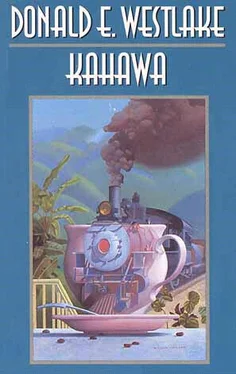Without actually acknowledging any connection between himself and the Angel’ s attempted piracy, he had led them to realize that if he’d been prepared to take charge of so much coffee he surely already had a customer for it. A customer at a good price, who would not be fussy about documentation.
He could bring these people together with Grossbarger. In fact, he would be delighted to.
They would also be delighted, of course, since their own shares would be proportionately higher, though Obuong did demur briefly, wondering about Balim, mentioning his name in an indecisive way. But Chase shrugged that off, saying, “The Asian? I’m not sure where he fits into this, if at all. He never owned the coffee. In fact, he’s never even had physical possession of it.”
“Still,” Obuong said, “still, Mr. Chase, one does feel a certain moral obligation.”
Meaning that to cut Balim out completely might have repercussions, might give Balim no reason not to make trouble. “If you want to be generous,” Chase said, admiring Obuong’s nobility with his smile, “I suppose some sort of emolument could be given to the Asian, to cover his expenses and so on. What should we call it? A finder’s free?”
Magon laughed, but Obuong gave the phrase serious consideration. “Perhaps tax credits on other transactions would be a better way to do it,” he suggested. “It would associate him not so clearly with this coffee.”
“Very good,” Chase said, and all at once realized it wasn’t the missing son that Balim was thinking about while staring out over the lake, it was Isaac Otera. Balim had to know he was being squeezed out of the deal, that it was happening here and now, but what could he do about it? He didn’t dare challenge Chase directly, not an Asian challenge a white man like Chase in this black country, no matter what Chase might or might not have done to him in the past. Frank Lanigan would be useless in a situation like this. Otera, Balim’s antibureaucrat, was the only one who might have been able to join this conversation and salvage something for his employer beyond a few vague tax credits. But Frank in his wisdom had placed Otera on the last raft; it would be half an hour at least before that raft reached shore, and by then it would be far too late.
In fact, the best thing for Chase to do at this moment, to cement the new alliance, was to leave these two alone to plot against him. Such plotting would of course presuppose the existence of the alliance, which would confirm it in their minds. He was confident there was little they could think of to do that would harm him. Also, his moving away now—opening the field, as it were, to Balim and Otera—would merely serve to underline his self-assurance. “I know you have other things to do,” he said. “I’ve taken up too much of your time.”
“No, no,” Obuong said, “you’ve been very helpful.”
“I hoped I could be. And tomorrow, after I’ve cleaned up, rested, had a good wash in a hotel, I’m sure we’ll all want to talk again.”
Obuong smiled. “We surely will,” he said.
Chase strolled away. Behind him, Magon excitedly began in Swahili, “He’s in no position to—”
There wasn’t even any necessity to eavesdrop, though it was nice to reflect that here he was in a new nation where all his secrets were intact.
There was a thick-trunked tree over near the smoldering oil-drum fire; Chase walked over there, sat down, and made himself more or less comfortable with his back against the tree, where he could look out over the lake and watch the rafts slowly arrive. Beside the Mercedes, Obuong and Magon murmured passionately together.
All that coffee, Chase thought, looking at the great wall of sacks, eighty feet long and twelve feet high. All in all, he was rather pleased at what he had wrought. All that coffee. All that money.
It’s pleasant to be a winner.
“I’m going for a walk,” Ellen replied, three different times. First she replied it to the night clerk, as she passed once more through the lobby. “Very late at night,” he suggested. “Insomnia,” she explained, and pushed through the glass doors to the outside world before he could say anything more.
Twenty minutes later, she replied it to the guard down by the planes parked beside the taxiway, who challenged her with a great deal of suspicion and perhaps even fright, though he was the one clutching the submachine gun. “No walk by planes,” he insisted, staring at her round-eyed. Pointing past him, she said, “Don’t be silly, I fly that plane. I can certainly walk around it.” He became uncertain, but clung to sureties: “No fly tonight.” She agreed: “No fly tonight. Walk tonight.” Then, hoping she looked a lot cooler than she felt, she simply stepped around him and went for a stroll among the planes, and he gave her no more trouble.
Not quite an hour after that, she replied it to the pleasant overweight girl who ran the empty coffee shop. “You be careful,” the girl told her, “and don’t go far away.” “No, I won’t,” Ellen promised, fortified by her two cups of coffee, and went back out.
The late-night air was as humid as ever, but with a chill in it off the lake. Turning the collar of her Burberry up, putting her hands in the pockets, Ellen strolled along through pockets of light and shadow, moving this time toward the main entrance from the highway.
The problem was, Frank had said twenty-four hours and that was just nonsense. If Lew was going to make it here at all, it would have to be before daylight; after that, a lone wanted white man wouldn’t be able to move an inch without discovery. And tomorrow night would be too late; Ellen couldn’t possibly refuse to leave with her plane.
So it was tonight that Lew had to get here, and the main questions were: How would he arrive, and how would he make contact? Poor Agatha Christie had had no hope of attracting Ellen’s attention after that phone call; she’d tried to read, but her eyes failed to focus on the page. And when she came to the conclusion there would be no way for Lew to signal her in this room—the night clerk received and listened to all calls coming into this building—she put the Christie down, shrugged into her Burberry, and went out to answer three times the question, “Where are you going?”
The two extremes of her walk were the main entrance and the runways. If Lew came boldly in via the main road, as she fully expected him to do, they would meet right here along the road and could make their plans. If his presence in Uganda were known, if he were being hunted, he might choose a less visible route, in which case he would surely head for the planes, and she would meet him there.
In the meantime, the wait was equal parts tension and boredom. Entebbe, which was perhaps the most underutilized commercial airport in the world by day, became an absolute desert of inactivity by night. The coffee shop was kept open very late, as though in deliberate defiance of reality, and here and there a slow-moving janitor cleaned, and the occasional soldier or sentry passed, but that was it. And for all Ellen knew, she would walk back and forth in this empty airport another six or seven hours, until well after sunup; for all she knew, she would walk here uselessly. Lew might not appear at all.
What would she do if daylight came, and no Lew? Thoughts of borrowing a car; but to drive where? She had no idea where he was, what had happened to strand him when the others left, what condition he was in. Either he had some sort of vehicle or he would certainly steal one. Either the Ugandan authorities were searching for him or they didn’t know he was in their territory. Either—
He’s a soldier, she reminded herself. He’s trained to survive in bad situations. He even trains others. He’ll get here.
Читать дальше












